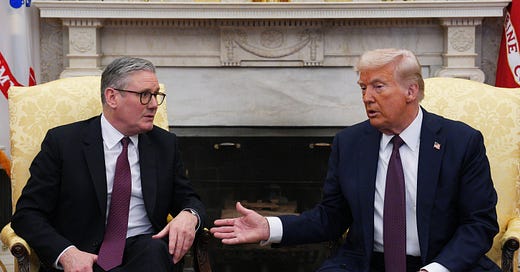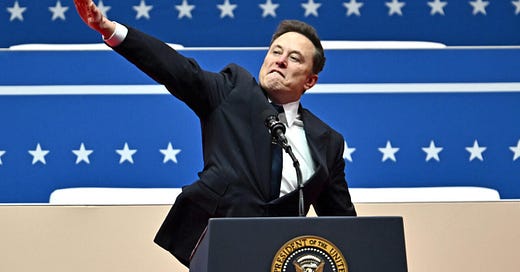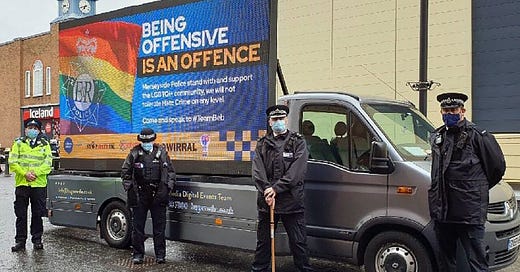
New battle lines are forming in the culture war. While the woke movement appears to be in retreat, the forces of authoritarianism are regrouping for a fresh assault. Rather than maintaining a straightforward conflict between right and left, the next phase of the culture war will most probably be waged between Europe and the United States. It has all the qualities of a novel by Henry James for the digital age, with the distinctions between the old world and the new brought once again into sharp focus.
Free speech will be the key issue. Most of us will have seen the footage of vice-president J. D. Vance last week in the Oval Office taking Keir Starmer to task for the ‘infringements on free speech that actually affect not just the British’ but also ‘American technology companies and by extension, American citizens’. Starmer pushed back, saying ‘in relation to free speech in the UK, I’m very proud of our history there’. It’s a bit like Hannibal Lecter boasting about his ongoing commitment to vegetarianism.
The word ‘history’ was apt, given that Starmer’s government is seemingly determined to ensure that free speech is consigned to the past. One of its first acts after seizing power was to ditch the Higher Education (Freedom of Speech) Act. In February, Angela Rayner revealed her plans for the establishment of a sixteen-member council on ‘Islamophobia’ which could see the criticism of religion criminalised. Meanwhile, Yvette Cooper has been staunchly defending the police for recording ‘non-crime’, while the chairman of the College of Policing, Lord Herbert, has suggested that the best approach to tackling the controversy is to simply rename ‘non-crime hate incidents’ as something more palatable. Apparently Lord Herbert believes that the problem is the nomenclature, not the fact that citizens are being investigated by the armed wing of the state for lawful behaviour.
All of this is before we get to Starmer applying pressure to the judiciary to mete out draconian sentences for offensive posts and memes on social media, and the government’s determination to crack down on online ‘disinformation’. Ours is an authoritarian government, and Starmer’s Orwellian denial of the truth of his position in the Oval Office is to be expected. Autocrats throughout history have enacted censorship ‘for the public good’. Today, they target ‘disinformation’, a term so vague that it can be applied to anyone who questions the narrative of the ruling class.
And so, as I say, the new front of the culture war will most likely be transatlantic. The US government will simply not tolerate the widespread censorship of its citizens by laws passed overseas. Jim Jordan, chairman of the Committee on the Judiciary of the House of Representatives, has already issued subpoenas to eight US tech companies to divulge all communications they have had with the UK government regarding ‘content moderation’ (i.e., censorship). Jordan is particularly concerned about the Labour government’s intention to empower OfCom to regulate social media, and he has specifically mentioned UK officials who ‘have already threatened to use UK laws to police American speech’.
The impact of these interventions by the US, if successful, may have the additional benefit of forging protections for free speech throughout Europe. This is why we have good reason to hope that in any future ideological conflict between these two powers, America will prevail. While in most cases we typically expect Europe to follow the lead of the US, it is clear that the principles enshrined in the First Amendment are anathema to the worldview of many European leaders. Whereas there is overwhelming agreement on both the left and the right of American politics that free speech is a non-negotiable condition of democracy, in recent years Europe has taken a markedly illiberal turn.
This key distinction was highlighted by J. D. Vance in his speech at the Munich Security Conference last month, when he pointed out that ‘free speech is in retreat’ in Europe and that its leaders are ‘running in fear’ of the electorate. One would have hoped that conference attendees would have taken this criticism on board, but instead they reacted angrily that the US vice-president had the temerity to challenge their pro-censorship stance.
This problem has always been at the root of the culture wars. Authoritarians believe that the only way to ensure societal stability is to force others to accept their will, and this in almost all cases means the silencing of opposing views. We have seen this scenario recur in the most brutal ways in tyrannical regimes throughout history. The Catholic Church burned blasphemers at the stake. The Soviet regime incarcerated critics in gulags. Hitler sent political dissidents to extermination camps.
But authoritarianism can also manifest in ways that are far less extreme. Woke activists believe that the only way to achieve ‘social justice’ is to compel speech, to ‘cancel’ non-conformists and to weaponise the legal system to enable censorship. Some anti-woke campaigners would like to see protests banned if they do not align with their views, or the repeal of liberal laws such as marriage equality (at least five states in the US are currently urging the supreme court to overturn Obergefell v. Hodges, the ruling that legalised marriage for gay people). These campaigns are not comparable with the horrors of the totalitarian regimes of the past, but they are symptomatic of the same authoritarian instinct.
While reducing the culture war to the binary of ‘America versus Europe’ is admittedly too simplistic – after all, there are powerful authoritarians on both sides of the Atlantic – if we do need a shorthand to understand how its next phase will play out, this will be far more accurate than outmoded notions of ‘Left versus Right’. Free speech is so embedded into American culture that it has been relatively immune to the illiberal trends we have seen developing elsewhere. Wherever we stand on the merits and demerits of Trump, liberals should be able to unite on this one indispensable ideal.
The risk, as always, will be that free speech itself will continue to be misconstrued as a tenet of the right; in reality, it’s simply that many on the left have consistently failed to uphold the principle. If it takes a right-leaning government to defend this most fundamental of liberties, and if it means that Europe ends up deferring to America, then so be it. On this issue at least, I hope that the new world will triumph over the old. If only Henry James were still around to tell us how the story ends.
















It's fine for Keir Starmer to be proud of our history in regard to free speech if by 'our' he means the people of these four nations and not the Labour Party. But the problem isn't history, it's the present and, God help us, the future. Both of which do not bode well for freedom of speech. We need these authoritarian out.
"Free speech is so embedded into American culture that it has been relatively immune to the illiberal trends we have seen developing elsewhere. "
This is only true if we see the threat to free speech as coming exclusively from the state as opposed to private actors (e.g. employers). One of the main and most worrying illiberal trends is the large amount of self-censorship that people engage in. Non-crime hate incidents/ hate crime is certainly an important part of that, but the threat of loss of livelihood is equally if not more important to the average person and in this the UK/Europe is way ahead of the US. For example, the First Amendment would not have protected Maya Forstater because the US constitution sees free speech purely in terms of citizens versus state and not citizen versus other powerful non-state actors.
I'm also not convinced that free speech is really all that embedded in the culture that gave us micro-aggressions, the idea that words are violence (and also silence is violence), that asking for evidence of racism/sexism is itself evidence of racism/sexism etc. These are not ideas that would take root and thrive in a community genuinely committed to the free exchange of ideas. I think rather what is embedded is a peculiar strain of libertarianism that is deeply suspicious of the state but believes that might makes right in the private sphere.
Which is not to say I don't recognise the serious problems with free speech in the UK, just that I'd be very wary of looking to the US for the antidote.